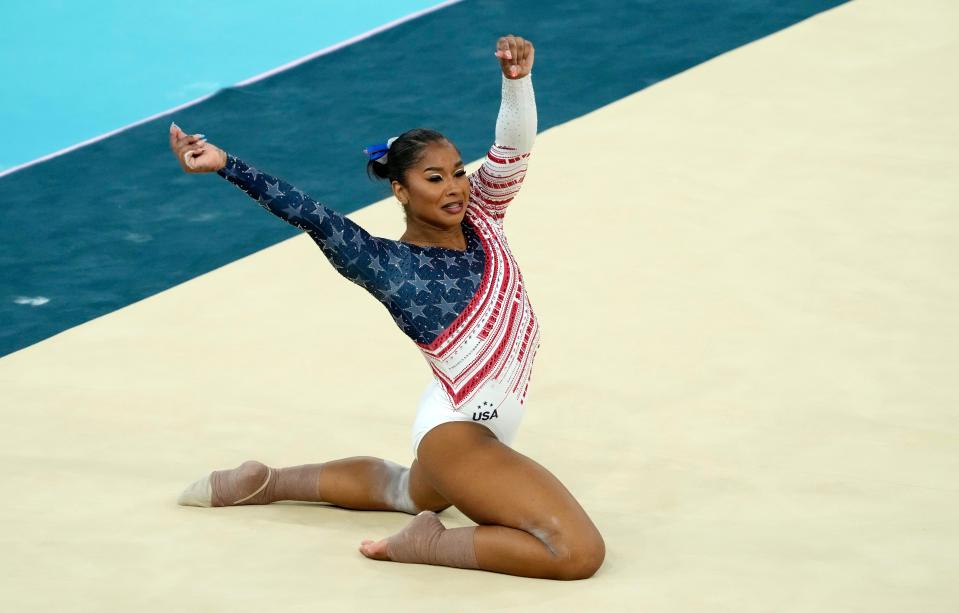Jordan Chiles must return Olympic bronze, IOC rules. USOPC says it will appeal decision
PARIS — U.S. gymnast Jordan Chiles will be required to return the individual bronze medal she received at the 2024 Paris Olympics, the International Olympic Committee announced Sunday morning.
The news comes less than 24 hours after the Court of Arbitration for Sport ruled that the judging panel for the women's floor exercise final made a mistake in granting an inquiry filed by Chiles' coaches, which moved the American gymnast into medal position. The Romanian Gymnastics Federation had challenged the validity of that inquiry, saying it was filed four seconds beyond the deadline by which any scoring appeals had to be submitted.
The IOC said in a statement that it will reallocate the bronze medal to Romania's Ana Barbosu, who had previously been fourth.
"We are in touch with the (national Olympic committee) of Romania to discuss the reallocation ceremony and with (the U.S. Olympic and Paralympic Committee) regarding the return of the bronze medal," the IOC said in a statement.

The USOPC said in a statement later Sunday that it will appeal the CAS decision to the Swiss Tribunal and/or European Court of Human Rights. It believes that Chiles "rightfully earned the bronze medal" and cited "critical errors" made by both the International Gymnastics Federation (FIG) and CAS.
"The initial error occurred in the scoring by FIG, and the second error was during the CAS appeal process, where the USOPC was not given adequate time or notice to effectively challenge the decision," the USOPC said in the statement. "As a result, we were not properly represented or afforded the opportunity to present our case comprehensively."Given these circumstances, we are committed to pursuing an appeal to help Jordan Chiles receive the recognition she deserves. We remain dedicated to supporting her as an Olympic champion and will continue to work diligently to resolve this matter swiftly and fairly."
Generally speaking, it is difficult to successfully overturn a CAS ruling. The Swiss-based court usually serves as the final arbiter of international sports disputes, with the Swiss courts usually intervening only in matters where there was a blatant violation of procedure.
The most recent high-profile case that has gone all the way up to the European Court of Human Rights involved two-time Olympic gold medalist Caster Semenya, who's claimed that track and field's rules regarding the participation of athletes with disorders of sex development are discriminatory.
Chiles, 23, wrote on Instagram on Saturday that she was leaving social media to protect her mental health.
The IOC's decision to take away Chiles' bronze medal is the latest emotional whiplash following the floor final on Aug. 6 at Bercy Arena. Chiles went last in the final and initially received a score of 13.666, which put her fifth behind both Barbosu and another Romanian gymnast, Sabrina Voinea. But after U.S. coaches filed an inquiry, or scoring appeal, with the judges, her score increased by one tenth of a point to 13.766. And she leapfrogged two Romanians, who both had scores of 13,700, to take bronze.
The last-minute inquiry came as Barbosu was already up on the podium celebrating the medal she thought she had won, prompting outcry from the Romanians. They later filed a formal appeal with CAS, alleging that the inquiry had been submitted four seconds past the 60-second deadline by which inquiries must be filed.
CAS ruled in the Romanians' favor and said Chiles' score should be reverted back to 13.666, but it punted any decisions on the final order of finish or medals to the International Gymnastics Federation, known as FIG.
FIG then confirmed it would reinstate Chiles' initial score and that she would be moved to fifth, but it punted any decisions on whether she would have to return her bronze medal to the IOC, which knocked over the final domino Sunday morning.
Chiles, 23, had spoken after the floor exercise final about how proud she was to earn an individual Olympic medal. While she contributed to the teams that won silver and gold, respectively, in Tokyo and Paris, she had never won an individual medal at the Olympics, nor qualified for an individual final at the Games.
"All this talk about the athlete, what about the judges?" Chiles' teammate Sunisa Lee wrote on Instagram. "Completely unacceptable. This is awful and I'm gutted for Jordan."
At least in recent years, the IOC has most commonly used the medal reallocation process in the wake of confirmed doping cases.
Earlier this week, members of the U.S. figure skating team from the 2022 Beijing Games received their golds, which were upgraded from silvers amid the fallout of the Kamila Valieva case. On Friday, the IOC held a rare ceremony to reallocate 10 medals from the 2000, 2008 and 2012 Games, with many of the changes due to Russians who were found to be part of the country's state-sponsored doping program.
Contact Tom Schad at tschad@usatoday.com or on social media @Tom_Schad. Follow columnist Nancy Armour on social media @nrarmour.
This article originally appeared on USA TODAY: Jordan Chiles must return Olympic bronze medal, IOC rules

